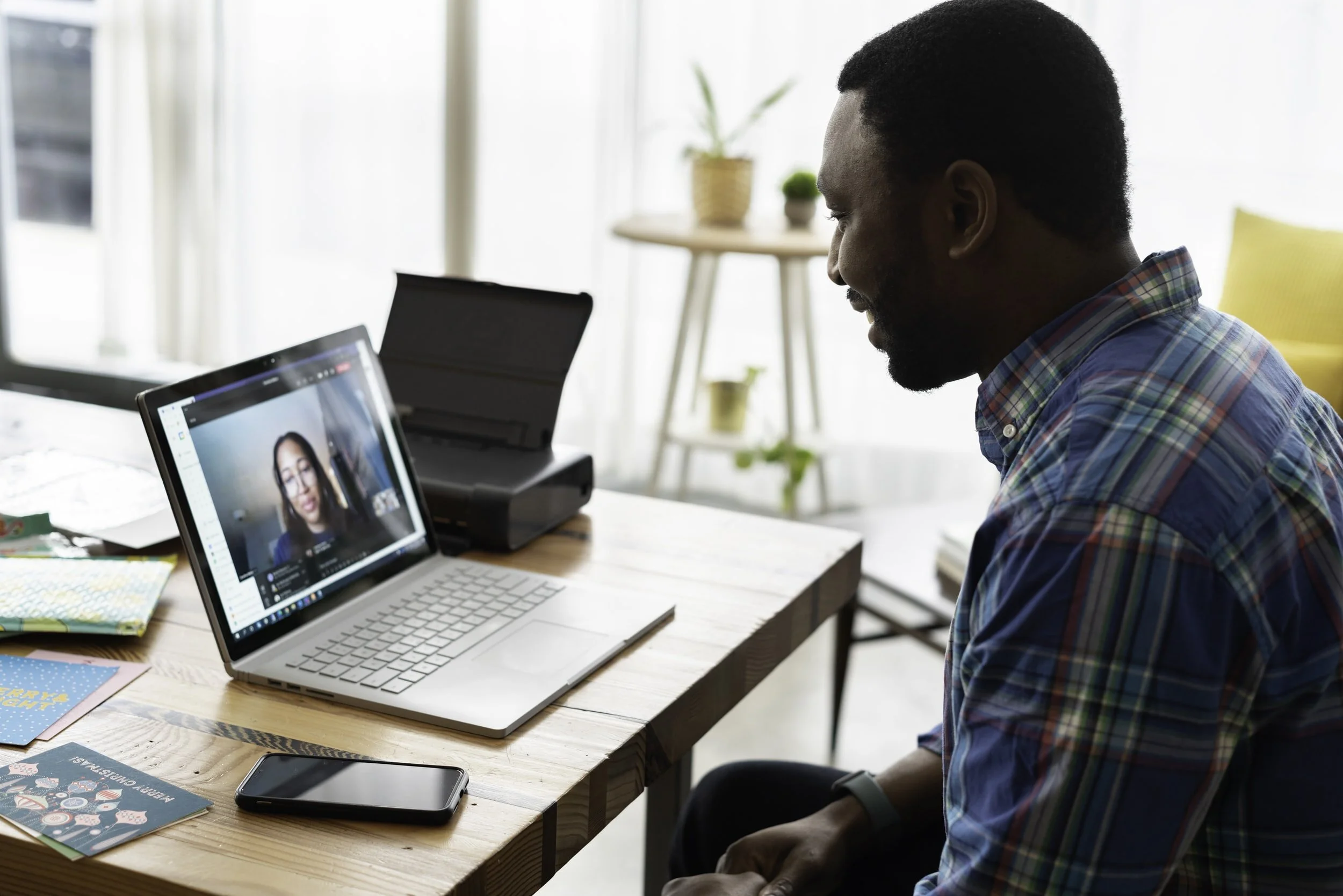Get Ready to Shine: Top Tips for Video Interviews
You’ve applied for a job and been offered a video interview: congratulations! Now take time to plan ahead using these tried and tested tips. Following this guide will help you understand how video interviews work and how to present yourself in the best possible light — and land that job.
More and more employers are conducting online interviews these days. Although video and in-person interviews have the same overall aim, they differ in some quite subtle and important ways that you should be aware of and prepared for.
Most of us find communicating over video more difficult than talking in person, so feeling intimidated at the thought of being interviewed online is perfectly normal. The good news is, you can perform well in online interviews by acquiring a few simple interview skills, all of which are described below. Now read on!
What is a video interview?
There are two types:
a live face-to-face interview taking place in real time over a video feed
a pre-recorded interview, in which each candidate faces the same list of questions and gets the same amount of time to respond. Your answers are recorded and reviewed later
Live video interviews are now quite common. Pre-recorded video interviews are newer and fewer, but are growing in popularity.
Live Video Interviews
These are straightforward, in-person interviews conducted by video. The interviewer asks you questions in real time, you answer, and the interview continues as a conversation. Apps such as Skype, Google Hangouts, FaceTime, Zoom and others provide the platform for this.
Pre-Recorded Interviews
This second type of interview feels more like an exercise or a presentation. Instead of talking to someone in real time, you read or listen to questions, and deliver an answer which is recorded on video. Employers use apps such Sonru, HireVue or SparkHire for this.
Questions can be delivered as audio, video and/or text. You might have to answer straight away, within a certain time limit (say, two minutes), or you might be given half an hour to prepare your answer. Sometimes you’ll get the chance to scrap your first answer if you mess it up, and have another go.
These interviews are quite unlike a live interview, even one on video. There will be no follow-up questions, no responses and no acknowledgement, all of which can feel very weird. This means you really should practise answering questions in this format so that you can perform well despite its strangeness.
All forms of video interview make it more difficult to gauge body language and other conversational cues, which adds to the pressure you feel as a candidate. The time limits imposed in pre-scripted interviews add even more, so here’s what you need to know in order to succeed in them.
Preparation
Treat your video interview exactly it as you would an in-person interview. Thoroughly research the organisation, its industry, its products and its achievements, so that you’re ready to discuss these during your interview. Research your interviewer too: HR professionals are generally very active on LinkedIn, and a quick Google search should reveal useful facts about the person you’re meeting. And remember to prepare some questions to ask the interviewer yourself, when the time comes.
Punctuality
For an in-person interview it’s polite to arrive 10 minutes early. The same applies to video interviews — except now you’re not just showing that you’re a punctual person, you’re allowing yourself time to log on. This could take some time if the interview platform is one you’ve never used, so make sure you do all this before your interview time. Being late, for no matter what reason, is not a good way to start a successful online interview.
Room set-up and technology
Choose a room where you’ll do all your video interviews. Be wary of coffee shops or co-working spaces with the sounds of coffee grinders and other people talking in the background. Make your space a part of your house that doesn’t have a lot of traffic, away from windows onto a busy street, and with a door you can close — and ask your family or flatmates to be quiet during your meetings so you can be free of distractions.
Position yourself so that the webcam is looking slightly down towards you — a little above your eye level is ideal. A low placement looking upwards is never flattering. Test out a video call to see how you look and what shows up in the background: is that a pile of laundry behind you? A plain wall is your best backdrop, or look for a bookcase or a nice painting to highlight. Make sure your lighting isn’t creating a glare or shadow, and try not to sit directly in front of a window because the daylight will ‘wash out’ your face on camera.
Test your internet connection. If the wi-fi isn’t great, switch to a hard-line connection so your video doesn’t lag. Make sure your microphone and camera are working properly (don’t use a tablet or phone camera unless you have to). Get to know the software being used for the interview. Log on to the common platforms mentioned above, watch tutorial videos or sign up for a free trial so that you’re confident using them.
Before your interview, close any unnecessary programs and web pages on your computer, and make sure you’re not downloading or uploading anything in the background. If your home connection is poor, consider going to a local library or the school or university you attend. Quiet rooms can often be booked in advance, and the internet there should be faster and more secure.
It goes without saying that before your interview you should take steps to make sure you definitely won’t be disturbed.
Body language and behaviour
In any interview, your body language strongly affects the way you are perceived. So take some time to work on your body language to make sure you come across well.
First, try to eliminate any tics or fidgeting. Playing with a pen in front of the camera, for instance, is really distracting. Fidgeting makes you look nervous and won’t display the confidence you want people to see. If you absolutely must fidget with something, practise squeezing a stress ball while keeping it out of the frame, maybe underneath your desk.
Second, work on your posture. Slumping hunched in your chair is not the look of a competent professional. Sit up straight, but relax your shoulders so that you look at ease. The good news is that you shouldn’t need to worry about your lower body. Without compromising any of the above, just get your legs and feet in as comfortable a position as possible.
Speaking clearly and slowly
This is a skill that takes practice to acquire. When people feel nervous about speaking, as in an interview, talking too fast is all too common. Nerves can make you rush through what you want to say, just to get it over and done with. Don’t let that happen. Get a friend or family member — anyone who will listen — to role-play interviews with you, and focus really hard on speaking clearly and slowly. With practice you’ll feel more comfortable, and you’ll come across as confident and professional.
No Googling
No matter how stealthily you think you can type, trying to Google something during the interview will always be noticeable. Don’t do anything that distracts you. Have all the information you need on the desk in front of you, or open in your browser: things like your CV, covering letter and the employer’s website.
Keep any notes you might need in front of you. It can be reassuring to have some basic notes about your examples and achievements to refer to, but don’t rely on them too much. If you spend time during the interview typing or looking at your screen rather than into the camera, you will come across as distracted and ill-prepared.
Listen carefully
Focus on listening when the interviewer speaks, and keep your mind from drifting off. Audio delays, and not paying attention to nonverbal cues, can make it easy to accidentally cut the other person off. Pay close attention to what the interviewer is saying and wait a few seconds before speaking.
Use notes
The good thing about video interviews is that you can have notes at the ready. Keep bullet-pointed notes to remind yourself of the examples you have for the competencies you may be asked about — not long written notes that you read, but bullet points that you talk around. Stick these on a wall behind the computer at eye level, so it doesn’t look as though you’re reading from notes.
Practise video interviewing
The best way to prepare for a digital interview is to do a run-through beforehand. Get a friend or family member to video-call you, and have them ask you typical interview questions. Repeat this process until you feel comfortable, and you’ll be much more relaxed going into your video interview for real. Feeling relaxed and confident not only makes the process less stressful, it also helps you answer the questions to the best of your ability. Practice makes perfect, after all.
Dress to impress
Here as anywhere, first impressions count, and it’s important that you look the part. Just because you’re at home doesn’t mean you don’t need to dress smartly: dress exactly as you would for an in-person interview. If you’re unsure how that should be, email or call the company’s HR department and ask. If in doubt, go with a suit or other smart, business-like attire.
Bear in mind that you may need to stand up to grab something in the middle of the interview, so it’s a good idea to wear interview clothes from head to toe. This gives you a sense of the seriousness of the occasion too. View yourself through your webcam to make sure your outfit looks professional on camera.
And finally…
Prepare and practise all of the above until you feel confident that you know what you’ll be going into and how you will put yourself across. At the appointed time, forget that you’re sitting at home, and focus on the screen in front of you. You are ready to shine: now go for it, and good luck!
Why not download Your Free Virtual Interview Checklist, (below) so you can take the stress out of virtual interviews.
I am Diana Dawson, Founder of Working Career. As a Professional Career Coach, Career Psychologist, Career Counsellor, Career Consultant, Executive Coach and Wellbeing at Work Coach, I work with organisations and individuals to help manage their careers.
I am an Accredited Master Coach with the Association for Coaching, a Coaching Psychologist and Cognitive Behavioural Hypnotherapist with nearly 20 years of experience in the field.
I work with professional people from different sectors and backgrounds to cope and flourish at work. I also run Career Workshops and Wellbeing Workshops for organisations.
I can provide one-to-one career coaching in Edinburgh or zoom sessions worldwide. I can provide Career Workshops at your organisation or remotely. Find out more about me here


